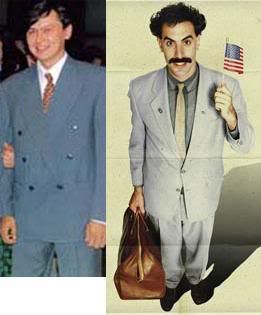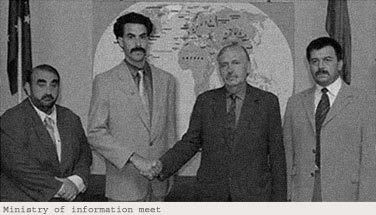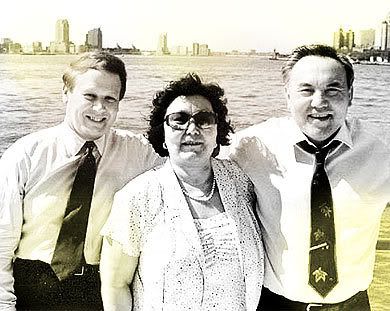Borat and Kazakhstan: The Political Psychology of the Relationship

Rakhat Aliyev from 1990s (left) and Borat today (right)
As the PR surrounding the Borat movie approaches a fever pitch ahead of the film’s worldwide opening on November 3 of this year, more and more articles are written about the reaction of the Kazakhstan government to the Borat figure and his portrayal of its country. Most western observers are amused by the outrage that the Kazakhstan government has expressed over Borat, but the ire of Kazakhstan’s officials is more understandable to those who have spent extensive time in the country. Borat bears significant meaning for the Kazakhstan ruling elite regarding their personal development and the development of the country as a whole. In other words, to understand why the Kazakhstan ruling elite has such a visceral reaction to Borat, one needs to understand from whence the Kazakh elite has come, where they are now, and where they wish to be in the future.

Borat at the fictional version of Kazakhstan's Ministry of Information, 2006

James Giffen (left), Sara Nazarbayeva (center), and Nursultan Nazarbayev (right) in Manhatten during the 1990s
The character of Borat is not about Kazakhstan per se. He is about that time in history after the U.S.S.R. fell and when its newly independent successor states were first engaging the world after decades of isolation. In other words, Borat is a satire of the former Soviet Union (FSU) of the early 1990s, Kazakhstan included. The pictures above are telling: Rakhat Aliyev in a double-breasted suit and President Nazarbayev wearing a short tie with his now-indicted former advisor from the U.S., James Giffen. This is from whence the Kazakhstan elite has come in the last fifteen years. In the early 1990s, Kazakhstan did not enjoy the respect of the international community. Instead, it was seen as a backwater and under-developed country that happened to be rich in resources. It was in this context that the President of Kazakhstan found a slippery middleman by the name of James Giffen to help him engage western oil companies. And, it was in this context that President Nazarbayev and his close associates allegedly took bribes passed through Giffen in the form of cash, snowmobiles, school tuition for their children, and other “gifts.” Today, as Kazakhstan is emerging as an energy “player” on the world stage, the early 1990s likely evoke embarrassment on the part of many in the Kazakhstan elite. Borat is a satirical reminder of that time, and, while the character is primarily meant to mock the geographically challenged nature of Americans, many in Kazakhstan’s elite take him as a personal affront about who they once were.
Today, Kazakhstan is an emergent energy power in the world. It is also becoming a geopolitical player in the sensitive region of Central Asia, caught between Russia, China, and the volatile Muslim states of Afghanistan, Pakistan, and Iran. In that context, the country and its elite want most of all to be recognized as a reliable and progressive influence on the region, a power broker that can balance the strength of Russia and China with that of the Muslim world. The country’s elite has already exchanged its short ties and double-breasted suits of the early 1990s for Gucci and Armani suits with conservative cuts and silk ties from Italy. Their children study in the best boarding schools of Europe and the United States. They vacation in the alps and in the south of Spain. Instead of taking bribes through middlemen, they are placing their assets on the London Stock Exchange. Indeed, Borat’s character at first glance seems out of place in the context of Kazakhstan’s booming oil economy.
Borat’s unsophisticated character, however, still shares something with the segment of Kazakhstan’s elite that emerged from the Soviet Union. This “old guard” in Kazakhstan’s elite still does not really understand or believe in the principles of a “rule of law,” “human rights,” and “representative government.” While Borat’s follies are more about “political incorrectness” with regards to women and ethnic minorities, his sometimes violent and always uncouth behavior as well as his blatant dismissal of a “rule of law” are also a satire of the character of Soviet (and post-Soviet) authoritarian rule. This is the role Borat is playing when he says “please come see my film, if it not be success, I be execute.” This is the part of Kazakhstan that Borat’s character still represents. There has yet to be an election in Kazakhstan that has been deemed free and fair by international observers; there continue to be politically motivated arrests without due process; the media is controlled by the state and the president’s inner circle; two opposition politicians were found dead within the last twelve months, and the investigations yielded results that were not accepted by most Kazakhstanis as legitimate; public protests are stifled in the country; opposition political parties are under constant harassment. If Kazakhstan has changed significantly in the economic sphere since the early 1990s, it has changed quite little politically since that time.
It is precisely this disconnect between economic and political reform that draws criticism of Kazakhstan from western governments and human rights organizations. Because they do not really believe in democracy and human rights, however, Kazakhstan’s “old guard” seems to think it can avoid international criticism through public relations campaigns rather than through real reform. They place inserts in the New York Times and the Economist to hail the country’s democratic accomplishments, they pay for television spots, and they hire expensive Washingtion political PR firms to do spin control. The problem is that all of the money in the world (or at least that amount available to Kazakhstan’s elite) cannot really replace reality with perception. Kazakhstan’s “old guard,” thus, retains much of Borat’s character no matter how much they try to hide it. That is why they hate Borat so much—because he is a part of them.
That being said, there are others in Kazakhstan’s elite who are not as outraged by Borat. They view the satire as being a joke about Americans and Europeans, whose ignorance of Kazakhstan and the rest of the world they frequently encounter. To such people, many of whom want to reform Kazakhstan politically, Borat may also reflect a satire of the aspects of their political culture the Soviet Union bequeathed Kazakhstan. In such reformers’ vision for the future of Kazakhstan, Borat will no longer have any relevance. If that vision comes to pass, all Kazakhstanis will be able to more comfortably laugh about the entire Borat escapade. Until then, however, Borat is a bitter reminder that Kazakhstan is not yet accepted as a member of the club of liberal democracies in our present world order.



19 Comments:
Very well written. I like the pictures. Very funny and exclusive.
Two things occur to me.
To suggest that Borat bothers the Kazakhstani elite because he reminds them of what they were like in an earlier time suggests that they recognize the difference. I would offer that they do not. There is a strong feeling here that Kazakhstan has always been world-class but was held down by the Soviet system. Borat bothers them because of the mere suggestion that Kazakhstan is or ever was backward, not that he reminds them of what things were like ten years ago-- and what they are still like today in most places that aren't Almaty or Astana.
I also find the implication that corruption is a thing of the past and that the bulk of economic activity in the country is legitimate now... amusing.
Aliev finally managed to muster the proper response (other than to ignore him) to Borat by inviting him to visit. However, at this point, they'd better take him to Almaty and keep him there. If he gets more than two hours outside the city, he'll see places that look more like the imaginary Kazakhstan he invented than he dreamed.
I am hardly suggesting that corruption is a thing of the past in Kazakhstan. Anything but.
All I can say is that if Borat does visit Dariga and Aliyev, I hope he brings his camera crew so we can check out their digs.
Great post. As many others have pointed out, it is tragically ironic that Kazakhstan appears out of touch with the rest of the world not because of the corruption and lack of political reform you talk about in your post, or the short ties and double-breasted suits of the '90s. Most people in the West aren't familiar with either concept. Borat's charade rings true precisely because of the gratuitous outrage.
One always reads about the young dynamos educated abroad that are now staffing up the Kazakhstani government; you'd think most of them would have said, "Hey, trying to sue him is just going to play into his hand," and that they would have had enough clout to have been listened to (though the invitation to visit suggests this may have happened).
Who knows, maybe Borat will precipitate more of a political shakeup than anyone would have thought, if for no other reason than bad PR advice on the part of the old guard.
I disagree that Borat reminds the Kazakh elite about themselves 15 years ago. There is nothing in the movie that truly exists in Kazakhstan. To my mind, Borat's movie is not about Kazakhstan at all. It is intended to expose prejudices and lack of knowledge about the rest of the world by the Americans. Actually the Americans should be most upset about Borat's movie not Kazakhs.
In my view, the reason why some of the Kazakh elite is upset with Borat's movie:
1 - Different cultures have different humour. If I had not been to the US, I would not have understood this humor. If something is funny in the US, it does not mean that it can be funny anywhere in the world. If one Kazakh was making of fun of another ethnic group, I am sure there would have been reactions one way or another, before engaging in humor one should study the country and analyze sensitivities, culture, history etc.
2 - After independence, in general, not only the elite, some if not most Kazakhs are puffed up with nationalism and when you see different humor that you don't understand it is a normal reaction. It has nothing to do that Borat reminds Kazakhs about themselves.
3- I am sure that some people in the US will truly believe what Borat is showing in his movie about Kazakhstan and I can understand government's decision to deal with this issue.
In sum, although I understand Borat's humor, he should be more careful not upsetting other people, he should take into consideration sensitivities that pertain to Kazakhstan, especially in the case of anti-semitism and treatment of women.
Interesting view!
It would be fairly easy to ridicule the Kazakh political elite as it is now - with its Armani suits, Pyramid of Understanding and ads on BBC. It would be equally annoying for them though.
A worthwhile read and overall a fair take on the Borat situation. For those of us who have lived in Kazakhstan, outside or Almaty and Astana, the Romanian village used to depict Kazakhstan is not always that far off.
But I don't suspect that Westerns will get that the joke is on them. Thus who are the real Borats in this world.
Actually, Borat's satire is aimed at redneckish population of America. Don't you get that?
http://www.borat2008.com
Is America ready for Prez Borat?
Forget Hillary, McCain, Romney and Obama.
The 2008 race is going to be all about the candidacy of Borat Sagdiyev (aka, British actor Sacha Baron Cohen).
Not only does the Kazakh newsman have a movie coming out next week — “Borat: Cultural Learnings of America for Make Benefit Glorious Nation of Kazakhstan” — he also recently unveiled his own campaign Web site, www.borat2008.com
As an American, I think I share the sentiments of most of America when I say that this movie has nothing to do about Kazakhstan and everything to do with the ignorance of Americans. There are a great many of us who are extremely ignorant and provide quite a bit of amusement for the rest of us. I can't think that there are too many people, American or not, who believe that Kazakhs can be as blatantly racist and backwards as Borat's character is.
While I am sure there are a few people in America who think that the Kazakhstan depicted in Cohen's movie is accurate, they are the minority. I believe most Americans believe the motto "If you can't laugh at yourself, who can you laugh at?" This especially rings true in an era where our president is on the wrong side of the bell curve in terms of intelligence.
...i just wonder, how a person can have such a low morale to create such ugly jokes & lies, i mean about borat. It's always easier to make fun of other countries, than laugh at ur own with people fond of bad taste jokes.
I have realized that this post is getting a fair number of comments about how the Borat film is really ridiculing the US. I couldn't agree more. If you would like to read more on that perspective, take a look at this post, which is also about Borat:
Kazakhstan, Borat, and U.S. Policy: Do We Really Get the Joke?.
Enjoy!
I think that the funniest aspect of the film was the number of Americans who agreed with the ignorant, and politically incorrect things coming out of Borats mouth. In fact some were elaborating, and taking the racest, and sexist themes further. Some of these people were college students, and other respectable members of society. Borat holds a mirror up to America, and says "With all your technilogical advances, and claims of freedom and liberation, look at your self."
Borat aimed at US more than Kazakhstan?
I don't think so!
Borat pokes fun at just some individuals and groups in US, while it portrays the ENTIRE country of Kazakhstan as boorish, stupid, antisemitic, anti-feminist etc.
STOP, Why dont you go there? I have. Speak about things you know, not what you imagine.
Stock market India is volatile and all those who speculate in market are loosing everyday. Please remember stock market is not for speculation purpose. If one feel investing in stock market is gamble then its better to think again.
One should always note that if they want to invest money they should do proper research be it fundamental research or technical research. Just think how come you can invest
your money without any convincing reason for the same?
Indian stock market is one of the most happening and emerging market. Major Indian stock exchanges are BSE and NSE and both are of world class standards.
So grab good stocks and invest that’s the bottom line.
We hope to see you in major profits.
Commodity Tips || Mcx Zinc Tips
its very interesting info...
Thankfulness to my dad who informed me relating to this blog, this website is really amazing.kazakh film
There are more than 10,000 Indian students studying in Kyrgyzstan. Thousands of students take admission in Kyrgyzstan every year. It is a golden opportunity to pursue MBBS in Kyrgyzstan for Indian students.
Astana Medical University is authorized by the Ministry of Education and Science of the Republic of Kazakhstan and established as an Academy in the year 1997. Astana Medical University a preferred choice of a majority of students looking for low cost MBBS.
Post a Comment
<< Home